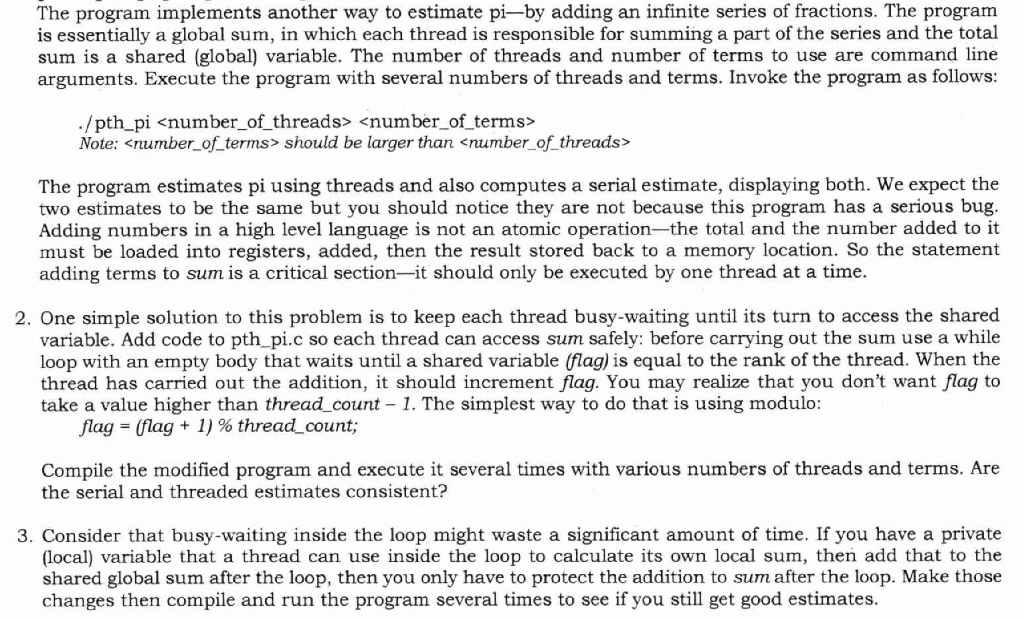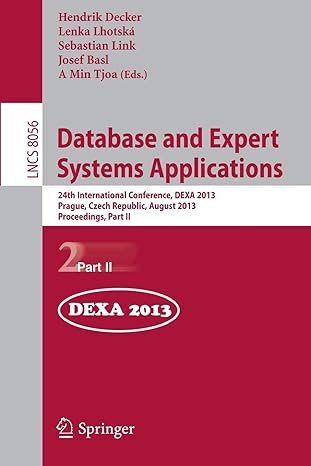Question
Numbers 2 and 3 need to implemented in the program given written in C. Here's the program given: /* File: pth_pi.c * Purpose: Try to
Numbers 2 and 3 need to implemented in the program given written in C.

Here's the program given:
/* File: pth_pi.c
* Purpose: Try to estimate pi using the formula
*
* pi = 4*[1 - 1/3 + 1/5 - 1/7 + 1/9 - . . . ]
*
* This version has a *very serious bug*
*
* Compile: gcc -g -Wall -o pth_pi pth_pi.c -lm -lpthread
* Run: ./pth_pi
* n is the number of terms of the series to use.
* n should be evenly divisible by the number of threads
* Input: none
* Output: Estimate of pi as computed by multiple threads, estimate
* as computed by one thread, and 4*arctan(1).
*
* Notes:
* 1. The radius of convergence for the series is only 1. So the
* series converges quite slowly.
*
* IPP: Section 4.4 (pp. 162 and ff.)
*/
#include
#include
#include
#include
const int MAX_THREADS = 1024;
long thread_count;
long long n;
double sum;
void* Thread_sum(void* rank);
/* Only executed by main thread */
void Get_args(int argc, char* argv[]);
void Usage(char* prog_name);
double Serial_pi(long long n);
int main(int argc, char* argv[]) {
long thread; /* Use long in case of a 64-bit system */
pthread_t* thread_handles;
/* Get number of threads from command line */
Get_args(argc, argv);
thread_handles = (pthread_t*) malloc (thread_count*sizeof(pthread_t));
sum = 0.0;
for (thread = 0; thread
pthread_create(&thread_handles[thread], NULL,
Thread_sum, (void*)thread);
for (thread = 0; thread
pthread_join(thread_handles[thread], NULL);
sum = 4.0*sum;
printf("With n = %lld terms, ", n);
printf(" Our estimate of pi = %.15f ", sum);
sum = Serial_pi(n);
printf(" Single thread est = %.15f ", sum);
printf(" pi = %.15f ", 4.0*atan(1.0));
free(thread_handles);
return 0;
} /* main */
/*------------------------------------------------------------------
* Function: Thread_sum
* Purpose: Add in the terms computed by the thread running this
* In arg: rank
* Ret val: ignored
* Globals in: n, thread_count
* Global in/out: sum
*/
void* Thread_sum(void* rank) {
long my_rank = (long) rank;
double factor;
long long i;
long long my_n = n/thread_count;
long long my_first_i = my_n*my_rank;
long long my_last_i = my_first_i + my_n;
if (my_first_i % 2 == 0)
factor = 1.0;
else
factor = -1.0;
for (i = my_first_i; i
sum += factor/(2*i+1);
}
return NULL;
} /* Thread_sum */
/*------------------------------------------------------------------
* Function: Serial_pi
* Purpose: Estimate pi using 1 thread
* In arg: n
* Return val: Estimate of pi using n terms of Maclaurin series
*/
double Serial_pi(long long n) {
double sum = 0.0;
long long i;
double factor = 1.0;
for (i = 0; i
sum += factor/(2*i+1);
}
return 4.0*sum;
} /* Serial_pi */
/*------------------------------------------------------------------
* Function: Get_args
* Purpose: Get the command line args
* In args: argc, argv
* Globals out: thread_count, n
*/
void Get_args(int argc, char* argv[]) {
if (argc != 3) Usage(argv[0]);
thread_count = strtol(argv[1], NULL, 10);
if (thread_count MAX_THREADS) Usage(argv[0]);
n = strtoll(argv[2], NULL, 10);
if (n
} /* Get_args */
/*------------------------------------------------------------------
* Function: Usage
* Purpose: Print a message explaining how to run the program
* In arg: prog_name
*/
void Usage(char* prog_name) {
fprintf(stderr, "usage: %s
fprintf(stderr, " n is the number of terms and should be >= 1 ");
fprintf(stderr, " n should be evenly divisible by the number of threads ");
exit(0);
} /* Usage */
The program implements another way to estimate pi-by adding an infinite series of fractions. The program is essentially a global sum, in which each thread is responsible for summing a part of the series and the total sum is a shared (global) variable. The number of threads and number of terms to use are command line arguments. Execute the program with several numbers of threads and terms. Invoke the program as follows: .pthpi
Step by Step Solution
There are 3 Steps involved in it
Step: 1

Get Instant Access to Expert-Tailored Solutions
See step-by-step solutions with expert insights and AI powered tools for academic success
Step: 2

Step: 3

Ace Your Homework with AI
Get the answers you need in no time with our AI-driven, step-by-step assistance
Get Started


